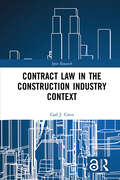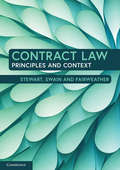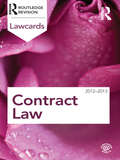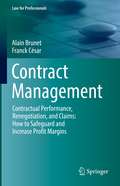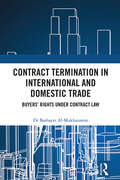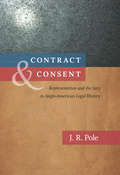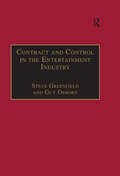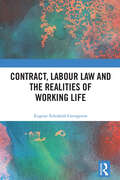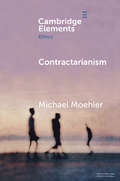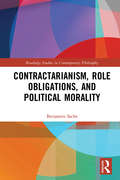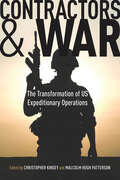- Table View
- List View
Contract Law in Perspective
by Linda MulcahyContract Law in Perspective complements 'black letter' treatments of contract by looking at legal doctrine and statutes in their social, political and economic contexts. It increases students' understanding of the law of contract as well as convinces them why it is so important to us all. In addition to describing the key doctrines in the field, it explains the ideology behind them and considers the extent to which they serve the needs of the business community and consumers. The book broadens understanding and appreciation of the subject by reference to the 'big ideas' in contract theory and how these relate to practice at a level which is suitable for students. This fifth edition: has been substantially revised and now includes sections on privity and the Rights of Third Parties Act as well as a discussion of the Law Commision's Unfair Terms in Contract draft bill includes new chapter introductions and summaries designed to help students identify the key points and reflect on what they have learnt provides advice on further reading pointing students towards sources for more detailed study now includes additional self-test questions for students at the end of each chapter to enable them to consolidate and practice at regular intervals.
Contract Law in the Construction Industry Context (Spon Research)
by Carl J. CircoThis book chronicles how contract cases from the construction industry have influenced, solidified, refined and particularized U.S. contract law. The book’s central claim is that the construction industry experience has helped to contextualize U.S. contract law and, therefore, has encouraged the common law to be more receptive to flexible legal standards and practices and less constrained by the relatively rigid rules that often characterize contract law. Other scholarly books analyze the themes, values, standards, and principles of contemporary contract law, but none captures how construction industry relationships and practices have influenced the common law of contracts. After providing an overview of construction law as a specialty of the practicing bar and as a field for scholarly inquiry, this book examines the construction industry cases that have most directly influenced contract law. It reviews how industry dispute patterns have caused courts to refine contract law principles or to adapt and modify other principles. Separate chapters explain the special roles that cases in the U.S. Supreme Court and in the lower federal courts have played in defining and distinguishing contract law in the construction industry. The final chapters assess implications the construction industry cases hold for contract theory writ large, and for the future of contract law. This book is essential reading for legal scholars, construction law and contract law specialists, and those interested in how the construction industry has helped shape the U.S. legal system.
Contract Law of Qatar
by Ilias Bantekas Ahmed Al-AhmedAs Qatar's aspirations of becoming a key location for international dispute settlement and international trade grow, so too does the importance of understanding private law in Qatar and the Gulf states. In this innovative book, Ilias Bantekas and Ahmed Al-Ahmed provide an original, English-language treatise on the contract law of Qatar. Using an abundance of case law, the authors combine scholarly and practice-oriented expertise to develop a comprehensive treatment of Qatari contract law. The analysis is drawn from a wealth of judgements from the Qatari Court of Cassation and Court of Appeal, much of which was previously inaccessible to readers. Bringing sophisticated, detailed insights on Qatari law to an English-speaking legal audience, this is a vital text for academics, practitioners and students who wish to comprehend this increasingly influential global player. This title is available as Open Access on Cambridge Core.
Contract Law, Selected Source Materials Annotated, 2021 Expanded Edition (Selected Statutes)
by Steven Burton Melvin EisenbergThese additions come alongside the material from the standard edition that has made it a longstanding and valuable addition to the study of contract law: UCC Articles 1 and 2, together with excerpts from Articles 3 and 9; the Restatement (Second) of Contracts; the Uniform Electronic Transactions Act, E-SIGN; the ALI's Principles of Software Contracts; the CISG and UNIDROIT: other statutes, directives, and administrative regulations, including the Magnuson-Moss Warranty Act, selected FTC Regulations, and excerpts from the Bankruptcy Code, the Uniform Consumer Credit Code, Regulation Z; and American Institute of Architects sample form contracts. Newly added to the 2021 edition are the United Kingdom Consumer Rights Statute and a form of a contract for the sale of goods. Each major document is introduced by a short annotation that explains the origins of the document, its central purpose, and the scope of its application. This supplement is suitable for use with all contracts casebooks.
Contract Law: Principles and Context (Cambridge Studies In English Legal History Ser.)
by Andrew Stewart Warren Swain Karen FairweatherContract Law: Principles and Context presents the development of contract law through a considered selection of cases that are both authoritative and used as factual examples to explain the law. The text introduces readers to the nature and range of contracts, the process for making a contract, rights and duties, adjustments to contracts, vitiating factors and unfair conduct, ending contracts, and remedies and restitution. The text considers the historical development of contracts through case law and legislation, then takes the reader to particular issues with contracts as they might arise in real life and navigates a legal pathway through them. Written in a clear and engaging style, Contract Law provides a fresh, topical and accessible account of the Australian law of contract, and is an invaluable resource for contract law students and practitioners.
Contract Law: Selected Source Materials Annotated 2014 Edition
by Melvin A. Eisenberg Steven J. BurtonThese annotations in context by explaining its origins, central purpose(s), scope of application, and current legal status. Students will understand the selection's point, purpose, and content; the 2014 edition includes excerpts from the European Sales Act, as adopted by the European Parliament; and Israel's Standard Contract Law.The annotations, together with the inclusiveness, currency, and convenience.
Contract Lawcards 2012-2013 (Lawcards)
by RoutledgeRoutledge Lawcards are your complete, pocket-sized guides to key examinable areas of the undergraduate law curriculum and the CPE/GDL. Their concise text, user-friendly layout and compact format make them an ideal revision aid. Helping you to identify, understand and commit to memory the salient points of each area of the law, shouldn’t you make Routledge Lawcards your essential revision companions? Fully updated and revised with all the most important recent legal developments, Routledge Lawcards are packed with features: Revision checklists help you to consolidate the key issues within each topic Colour coded highlighting really makes cases and legislation stand out Full tables of cases and legislation make for easy reference Boxed case notes pick out the cases that are most likely to come up in exams Diagrams and flowcharts clarify and condense complex and important topics '...an excellent starting point for any enthusiastic reviser. The books are concise and get right down to the nitty-gritty of each topic.' - Lex Magazine Routledge Lawcards are supported by a Companion Website offering: Flashcard glossaries allowing you to test your understanding of key terms and definitions Multiple Choice Questions to test and consolidate your revision of each chapter Advice and tips to help you better plan your revision and prepare for your exams Titles in the Series: Commercial Law; Company Law; Constitutional Law; Contract Law; Criminal Law; Employment Law; English Legal System; European Union Law; Evidence; Equity and Trusts; Family Law; Human Rights; Intellectual Property Law; Jurisprudence; Land Law; Tort Law
Contract Management: Contractual Performance, Renegotiation, and Claims: How to Safeguard and Increase Profit Margins (Law for Professionals)
by Alain Brunet Franck CésarThis book presents the latest findings relating to behavioral economics and the digital tools applied to contract management. There has been a decisive change in the role of contracts in the past decade, with contracts being transformed from purely legal necessities designed to protect against worst-case scenarios into tools for optimizing ongoing and mutually profitable business relationships with customers. There is an increasing emphasis on tight contracts, where time-risk and additional costs are passed on to the prime contractor, who may suffer heavy penalties in the event of non-performance. Contracts shape the behavior of the parties involved and as such have a major impact on project success. The contract manager’s goals are to protect the interests of the company and its shareholders by minimizing the company’s financial and contractual liabilities and to maximize its profitability while ensuring end-user satisfaction. The contract is usually written before the design is fully developed, and there is often a mismatch between contractual specifications and what the customer actually wants. Good contract management entails preserving the rights of the contractor by ensuring all parties respect their contractual obligations; providing advice to the project managers and engineering team; preparing profitable amendments to contracts or change requests; maintaining good record-keeping in the event that claims arise; filing notices when necessary; and guiding the project to a profitable conclusion. Like the ancient Chinese game of Go, moves made early in the game (notification of events) can shape the nature of a potential conflict one hundred moves later (arbitration threat). Contract management can also smooth the relationship between partners, allowing well-balanced “don’t-trade-a-dollar-for-a-penny” contracts to be managed through an established process rather than as sporadic events (we cannot claim to be in control of our business if we are not in control of the contracts on which it depends). Managing a contract with a mix of incomplete manuals, fragmented information, and poor planning can drive companies to “reinvent the wheel.” Contract management promotes a three-phase sequence to streamline information flows across the contract lifecycle, from the bid phase to performance, project closeout, and final payments.
Contract Termination in International and Domestic Trade: Buyers’ Rights Under Contract Law
by Bashayer Al-MukhaizeemThis book highlights the right to terminate a contract, yielding invaluable insights to enable policymakers and legal practitioners to facilitate international trade.In the modern landscape of globalised trade, the imperative of a harmonised legal framework of contract law capable of fostering stability and trust in cross-border trade has never been more pronounced. This is represented in the United Nations Convention on Contracts for the International Sale of Goods (CISG), providing rules that can be known, understood and abided by globally. This book focuses on the termination of contracts, one of the harshest remedies when a sale of goods contract is breached by the seller. Breaches by the seller dealt in this book are confined to breaches of contractual description, delivery time and quality of goods, which are the most common violations of sale of goods contracts. This book scrutinises the methods adopted for challenging or facilitating contractual termination by CISG as a transnational law, as well as the Sale of Goods Act 1979 (SGA) and Kuwaiti law (KLaw), both of which are national laws of non-contracting states of CISG. This study also draws attention to lacunae and practical issues, focusing on critical analyses of law and cases, and recognises the adopted themes underlying each law to find the degree of their legal clarity and the threshold upon which termination can be granted. This comprehensive analysis also provides inspiration for beneficial changes by weighing the pros and cons of each system.The book will be of interest to practitioners, students, and scholars in the fields of contract law, trade law, commercial law and international law.
Contract Theory for Wireless Networks (Wireless Networks)
by Zhu Han Yanru ZhangThis book presents theoretical research between wireless communications, networking, and economics using the framework of contract theory. This work fills a void in the literature by closely combining contract theoretical approaches with wireless networks design problems. Topics covered include classification in contract theory, reward design, adverse selection, and moral hazard. The authors also explore incentive mechanisms for device-to-device communication in cellular networks, insurance plans for service assurance in cloud computing markets with incomplete information, multi-dimensional incentive mechanisms and tournament based incentive mechanisms in mobile crowdsourcing. Financial applications include financing contracts with adverse selection for spectrum trading in cognitive radio networks and complementary investment of infrastructure and service providers in wireless network visualization. This book offers a useful reference for engineers and researchers in the wireless communication community who seek to integrate the notions from contract theory and wireless engineering, while emphasizing on how contract theory can be applied in wireless networks. It is also suitable for advanced-level students studying information systems or communications engineering.
Contract and Consent: Representation and the Jury in Anglo-American Legal History
by J. R. PoleIn Contract and Consent, the renowned legal historian J. R. Pole posits that legal history has become highly specialized, while mainstream political and social historians frequently ignore cases that figure prominently in the legal literature. Pole makes a start at remedying the situation with a series of essays that reintegrate legal with political and social history. A central theme of the essays is the link between Anglo-American common law and contract law and American political and constitutional principles. Pole also emphasizes the political functions of legal institutions in English and American history, going so far as to suggest that we need to divest ourselves of any notion of the separation of powers. Instead, we need to acknowledge the historical role of courts, juries, and the common law as agencies of political representation and as promulgators of law and policy.Other essays show the implications of independence for American law, and how American political scientists converted the concept of sovereignty from its authoritarian claims in the eighteenth century into a product of the political process in the nineteenth and twentieth centuries. Although the American colonies made their own versions of the common law,there was no simple division between "English" and "American" law. But it was of fundamental importance that an entitled, landed aristocracy was never imported into or allowed to take root in America, with the result that American law was much simpler than its English counterpart, with the latter's accretion of esoteric language and procedures.Having established the basis of Anglo-American legal history in contract and common law in part one, in the second half of the volume Pole explores various constitutional and legal themes, from bicameralism in Britain and America and the role of the Constitution in the making of American nationality to the performance of representative institutions in the century following the American Revolution.
Contract and Control in the Entertainment Industry: Dancing on the Edge of Heaven (Studies in Modern Law and Policy)
by Steve Greenfield Guy OsbornThis book examines the contractual relationships of creative artists within a number of areas of the entertainment industry. Whilst it focuses specifically on football, cricket, boxing and music, developments within other parts of the entertainment business are observed. The book also charts the concessions (artistic, professional and personal) that are often made by such artists in an attempt to achieve success and the consequent legal problems that may arise from their working relationships. Embracing historical materials and current legal practices, Contract and Control in the Entertainment Industry will be of interest to academics and students in the fields of law, sociology and cultural studies. It will also appeal to anyone who is interested in seeing how many areas of the entertainment industry have placed very restrictive contractual controls on the raw materials of the industry - the creative artists.
Contract for the International Carriage of Goods by Road (Law for Professionals)
by Chiara TincaniThis book discusses the intensification of international transport services as the consequence of an increasingly capillary economic integration. In particular, in some European countries, such as Belgium, the Rhine area of Germany, and Denmark, the application of the Geneva Convention on the carriage of goods from the case law point of view is even more thorough than that of national law. Even though this is not the case for all countries, the Geneva Convention is a core text both for the scientific debates on the issue and for commercial operators. Therefore, proposing an up-to-date reading of the Convention is of utmost importance from the practical point of view, especially considering that, thanks to the consistent application of the International Carriage of Goods by Road contract, the Convention has become an essential prerequisite for the development of traffic.In ten chapters, this book reviews the Convention’s structure and considers the case-law approaches and trends of most countries belonging to the European Union. It covers contracts and different negotiating models as well as compensation, liability of the carrier, and damages.
Contract in Context
by Qi Zhou Richard Austen-BakerContract in Context provides an easy to read, in depth analysis of the purpose and role of contract law and the theories that surround it. It looks at the historical development of contract law as well as providing detailed analysis of some of the leading theoretical explanations and how they are applied on an international level. The book’s accessibility is enhanced by text boxes defining key concepts and terms and by bullet-point lists and descriptions further enlivened by biographical notes for leading figures and scholars. This ensures that students are able to gain a firm grasp and a clear understanding of the narratives and theories explained in the book. Contract in Context is unique in that it is not limited to one jurisdiction, making it ideal for students around the globe wishing to develop or expand their knowledge of contract law.
Contract, Labour Law and the Realities of Working Life
by Eugene Schofield-GeorgesonThis book offers a critical and timely account of how labour law has become a means for protecting employers rather than workers.The past few decades have witnessed something of a ‘silent revolution’ in the traditional protective role that labour law has played in the lives of workers. While this transformation has been overt in the realm of the market and at the level of the legislature, the role of the judiciary in this process remains significantly under-studied. Focussing on Australia, but drawing also on material from New Zealand, the UK and Canada, this book investigates how the common law has intervened to shape labour law in the image of commercial contract, determining disputes and defining legal issues by ignoring the realities of working life. Under this new conception of labour law, industrial relations between workers and employers are rarely reciprocal or relational. Rather, they are determined by the legal meaning and purpose of the contract of employment, drafted by lawyers for the benefit of employers and their human resources departments. Having demonstrated how approaches to contractual formalist legal reasoning have redefined labour law, this book goes on to propose an array of innovative legal and policy strategies to restore the protective role of labour law to the employment relationship.Scholarly, but also accessible to students, this book will appeal to those with interests in labour law, contract law and sociolegal studies.
Contract, Tort and Restitution Statutes 2012-2013 (Routledge Student Statutes)
by James Devenney Howard Johnson‘Focused content, layout and price - Routledge competes and wins in relation to all of these factors’ - Craig Lind, University of Sussex, UK ‘The best value and best format books on the market.’ - Ed Bates, Southampton University, UK Routledge Student Statutes are: • Exam Friendly: un-annotated and conforming to exam regulations • Tailored to fit your course: 80% of lecturers we surveyed agree that Routledge Student Statutes match their course and cover the relevant legislation • Trustworthy: Routledge Student Statutes are compiled by subject experts, updated annually and have been developed to meet student needs through extensive market research • Easy to use: a clear text design, comprehensive table of contents, multiple indexes and highlighted amendments to the law make these books the most student-friendly Statutes on the market Competitively Priced: Routledge Student Statutes offer content and usability rated as good or better than our major competitor, but at a more competitive price • Supported by a Companion Website: presenting scenario questions for interpreting Statutes, annotated web links, and multiple-choice questions, these resources are designed to help students to be confident and prepared.
Contractarianism (Elements in Ethics)
by Michael MoehlerThis Element provides a systematic defense of moral contractarianism as a distinct approach to the social contract. It elucidates, in comparison to moral conventionalism and moral contractualism, the distinct features of moral contractarianism, its scope, and conceptual and practical challenges that concern the relationship between morality and self-interest, the problems of assurance and compliance, rule-following, counterfactualism, and the nexus between morals and politics. It argues that, if appropriately conceived, moral contractarianism is conceptually coherent, empirically sound, and practically relevant, and has much to offer to contemporary moral philosophy.
Contractarianism, Role Obligations, and Political Morality (Routledge Studies in Contemporary Philosophy)
by Benjamin SachsThis book argues that contractarianism is well suited as a political morality and explores the implications of deploying it in this way. It promises to revive contractarianism as a viable political theory, breaking it free from its Rawlsian moorings while taking seriously the long-standing objections to it. It’s natural to think that the state owes things to its people: physical security, public health and sanitation services, and a functioning judiciary, for example. But is there a theory—a political morality—that can explain why this is so and who the state’s people are? This new contractarianism deploys a reversed state of nature thought experiment as the starting point of political theorizing. From this starting point it develops a political morality: a theory of the common ground of the role moralities attached to the various roles within the state. Contractarianism, so understood, can provide a basis for already popular ideas in political theory—such as political and legal liberalism—and overturn conventional wisdom, for example that the state is obligated to secure justice and that animals should have no legal standing. Contractarianism, Role Obligations, and Political Morality will be of interest to scholars and advanced students working in moral and political philosophy.
Contracting International Employee Participation: Global Framework Agreements (International Law and Economics)
by Felix HadwigerIn the last two decades, multinational companies (MNCs) and global union federations (GUFs) have started to negotiate so-called global framework agreements (GFAs) which define minimum standards for labor conditions across their locations. This book focuses on the question why companies conclude GFAs, and identifies four groups of incentives: reduction and privatization of conflicts; public relations; promotion of equal competitive conditions; exogenous requirements and avoidance of public regulation. Based on an in-depth analysis of incentives considered to play a dominant role in the decision of companies to conclude GFAs, the book attempts to predict under which conditions GFAs can be expected to proliferate in the future.
Contracting Law
by Amy Kastely Deborah Post Nancy Ota Deborah ZalesneRevised and updated to 2015, the fifth edition of Contracting Law continues the clear explanations of contract doctrine, engaging cases, and thought-provoking cultural and historical materials that have made this casebook a favorite of students and professors. Students and faculty appreciate the fact that no separate statutory supplement is necessary. Selected provisions from the Restatement Second of Contracts and the Uniform Commercial Code are included in the casebook as appendices. The revised Student Workbook (purchased separately) is updated to complement the fifth edition with flow charts, vocabulary lists, problems and structured exercises to help students understand legal doctrines, case briefing, and synthesis. Students can use the workbook independently or exercises can be used in class discussions. The fifth edition augments the cultural material with notes and questions showing the social contexts for specific contract doctrines. Many sections are shortened and reorganized for ease of use in 3-, 4-, or 5-credit courses, while UCC coverage is maintained for those courses designed to include sales law.
Contracting for Space: Contract Practice in the European Space Sector
by Ingo BaumannRecent significant developments in the European space sector have had an impact on business and the growth of national and European commercial space law. This book analyses and assesses the legal issues and key factors influencing the space sector in Europe. It is an up-to-date guide to the regulatory background of space projects and examines the typical legal problems which need to be solved by practitioners in the field. Taking into account public and commercial international law and practice, this book examines substantive issues of law specific to launchers, satellite manufacturers and space service providers with contributions from leading experts and practitioners in the field of European space law and policy.
Contracting with Citizens: How Morals, Politics, and Laws Shape Cities (Routledge Research in Planning and Urban Design)
by E.W. (Michiel) StapperThis book demonstrates that contracts, community intermediaries, and participatory processes are closely interlinked, and they can change urban politics.In participatory processes, residents negotiate with policymakers about the future of their neighborhood. In the last few decades, this happened increasingly in co-creation sessions where citizens are deemed to have an equal position vis-a-vis developers and civil servants. The goal of this book is to understand and theorize how these negotiations affect collective action. The book will scrutinize the role of contracts, community intermediaries, and participatory processes in development projects and planning policies. Using a comparative case study of Amsterdam, Hamburg, and New York, this book reveals how seemingly fresh and novel planning practices are used to justify processes of capital accumulation and reveals how morals, politics, and law can create institutional change.The book presents a novel theoretical approach to studying urban politics, putting emphasis on (private) law and the material arrangements of participatory processes. It will be of interest to researchers and students of planning, geography, sociology, public administration, and law and will provide valuable lessons for practitioners interested in understanding the effects of contractual governance on neighborhoods.
Contractor Health and Safety Compliance for Small to Medium-Sized Construction Companies
by Clinton Aigbavboa Wellington Thwala Zakari MustaphaThis book explores the formation of small and medium-sized construction company's (SME) compliance with health and safety issues in developing countries. Little has been written about the formation of SME contractors' health and safety compliance for developing countries, especially, in the sub-sahara regions where construction and infrastructure development activities have significantly increased in order to serve the development mandate of those countries. Thus, this book will provides insight into construction safety for SMEs, as well as health and safety compliance, and its policy implementation trends and development.
Contractor Safety Management
by Gregory WiIIiam SmithA Winner of the Educational Award by the World Safety OrganizationContractor safety management is often seen as nothing more than a subset of general safety management in that no special consideration needs to be given to understanding the difficulties of the contract environment. This leaves contractors endlessly juggling competing and someti
Contractors and War: The Transformation of US Expeditionary Operations
by Christopher Kinsey Malcolm Hugh PattersonThe U. S. military is no longer based on a Cold War self-sufficient model. Today's armed forces are a third smaller than they were during the Cold War, and yet are expected to do as much if not more than they did during those years. As a result, a transformation is occurring in the way the U. S. government expects the military to conduct operations-with much of that transformation contingent on the use of contractors to deliver support to the armed forces during military campaigns and afterwards. Contractors and Warexplains the reasons behind this transformation and evaluates how the private sector will shape and be shaped by future operations. The authors are drawn from a range of policy, legislative, military, legal, and academic backgrounds. They lay out the philosophical arguments supporting the use of contractors in combat and stabilization operations and present a spectrum of arguments that support and criticize emergent private sector roles. The book provides fresh policy guidance to those who will research, direct, and carry out future deployments.

